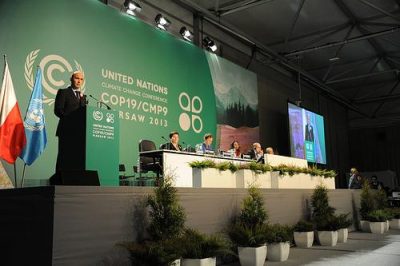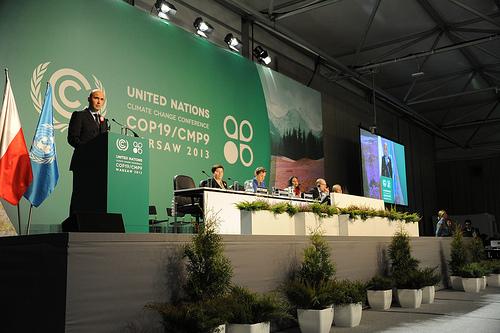
Opening statement by the President of COP19 Mr. Marcin Korolec (UNclimatechange/flickr)
To mark the start of the UN Climate Change Conference (COP19) in Warsaw, Poland, a new series of Climate Justice briefings has been released offering critical perspectives on a number of the crucial issues under discussion.
First up, A Vision for Equity argues that negotiations should focus on setting a “global emissions budget” to keep temperature rises within the 1.5 degree target that would avoid dangerous climate change. Using historic emissions data as well as records of current per capita emissions, it calculates what developed and developing countries would need to do within that framework to contribute their fair share to addressing the climate problem.
A system of international climate controls based on science and the principles of equity is needed to achieve that target, which means climate negotiators should resist any attempts to deregulate international climate controls. That’s the subject the next briefing, which sets out a case against the “pledge and revenge” approach that many developed countries are pursuing within negotiations for a new international climate treaty.
The new system risks being even weaker than the outgoing Kyoto Protocol, while threatening to retain or even expand upon the carbon markets—one of the most problematic aspects of the existing agreement. This briefing on markets explains why carbon trading is not the answer. Instead of setting up “new market mechanisms,” the failure of existing markets should be grounds for a moratorium on the development of new ones.
Non-market approaches should be pursued instead, and that’s the subject of the fourth briefing in this series, which looks at the positive role that could be played by Globally Funded Renewable Energy Feed-In Tariffs.
Background on COP19
The web is awash with reports on the UN climate talks, but to cut through to the core issues you could do far worse than starting with this useful guide to “the Big Fights, Red Lines and Initial Predictions” from [Earth in Brackets], who will also be blogging and tweeting. Our colleagues at climate-justice.info have also issued this useful media background briefing covering the basic issues from Poland, alongside some snappy quotes.
The Warsaw conference is being hailed in some quarters as a “finance COP,” the implication being that debates on the money needed to address climate change will take center stage. At the same time, we’re witnessing an attack upon and dilution of the very notion of “climate finance”, which refers to public transfers of resources from developed to developing countries. Brandon Wu of ActionAid USA picks up the story here.
In other quarters, COP19 is being talked about as a haven for corporate lobbyists – an impression that the Polish Presidency of the meeting has done little to counter, by seeking sponsorship from “climate crooks” such as ArcelorMittal, Alstom and BMW. Corporate Europe Observatory and the Transnational Institute look at corporate influences on the UN Climate Change Conference with itsCOP19 Guide to Corporate Lobbying. They’ll also be blogging from Warsaw.
During the COP itself, it’s easy to miss the latest developments with several meetings taking place simultaneously. Third World Network’s briefing papers are an invaluable resource to find out who said what in the meeting halls of Poland’s national stadium.
And finally, as the COP in Warsaw gets underway in the shadow of the deadly Typhoon Haiyan in the Philippines, it’s worth pausing to take in the words of that country’s lead negotiator, Yeb Sano, who reminded delegates of the true costs of continued inaction on climate change.
